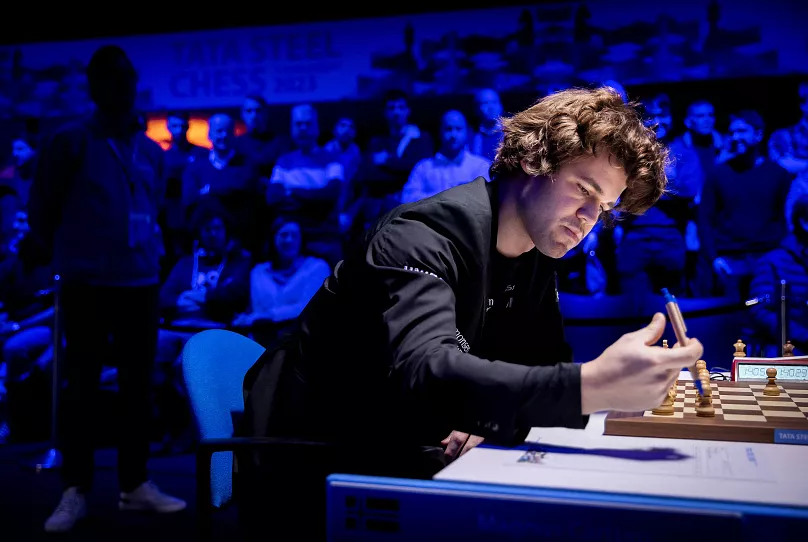Introduction to the Controversy
The chess world was recently rocked by allegations of cheating against a renowned chess champion, igniting a fierce debate among enthusiasts and professionals alike. This uproar began during a high-stakes match where the champion’s gameplay raised red flags among observers, culminating in suspicions of foul play. Reports surfaced suggesting the involvement of subversive technology, notably the use of anal beads as a communication device to receive moves from an accomplice, a claim that has since proliferated across various media platforms.
As details unfolded, the chess community became embroiled in discussions regarding the ethical implications of technology in competitive environments. The allegations have prompted intense scrutiny not only of the player involved but also of the broader structural integrity of the chess world. Reactions have ranged from palpable outrage to stern calls for more stringent regulations surrounding technology use in competitive chess matches. It is against this backdrop that technology mogul Elon Musk weighed in, significantly amplifying the discourse. His perspective brings to light the convergence of technology and traditional games, a theme that resonates deeply with his broader interests in innovation and disruption.
elon musk agrees: chess champion cheated, used anal beads for comms support for the belief that the chess champion cheated using high-tech communications highlights a growing concern about the influence of advanced tools in sports and competitive scenarios. These developments could lead to long-standing implications for how games are perceived and regulated, ultimately altering the landscape of competitive chess. Elon Musk agrees, suggesting a cultural shift is underway in how we view the intersection of technology and skill within competitive domains, exemplified by these allegations against the chess champion. This controversy not only challenges the integrity of chess but also reflects a broader dialogue about the future of competition itself.
The Allegations: What Happened?
The recent controversy surrounding the chess champion has taken the chess community by storm, raising questions about integrity and ethics within competitive chess. The allegations assert that the champion in question used anal beads equipped with sophisticated technology to communicate secret information during a pivotal match. This shocking claim has led to widespread discussions and debates about fairness in chess and the measures necessary to uphold the sport’s integrity.
The timeline of events began with the match itself, where unexpected moves by the champion drew scrutiny. Critics soon began analyzing the game footage closely, suggesting that the precision and timing of the moves were inconsistent with typical player behavior. Following this, prominent figures within the chess community initiated an investigation, leading to intense speculation and allegations regarding the use of communication devices disguised as anal beads. This sensational claim has since attracted significant media coverage, including endorsements from high-profile individuals like Elon Musk, who openly expressed his agreement with the notion that deception was at play during this match.
This controversy has triggered a wave of reactions within the chess community. Many players, commentators, and enthusiasts have voiced their opinions, with some calling for stricter regulations and scrutiny in competitions to prevent any future integrity violations. The implications of this incident extend beyond one match, raising fundamental concerns about the potential for technology to undermine traditional gameplay. As the chess world grapples with these troubling allegations, discussions about the ethics of using technology in games have become more pertinent than ever.
Ultimately, the investigation into the use of anal beads for communication will not only impact the accused champion but will also shape the future of chess competitions. The ongoing debates highlight the critical need for transparent and ethical practices in all sporting arenas to protect the spirit of fair play and competition.

Elon Musk’s Response: A Game Changer?
Elon Musk’s recent comments regarding the allegations of cheating involving a chess champion have garnered considerable attention. Musk, known for his innovative approach to technology and his outspoken views on various subjects, added a significant layer to the ongoing discourse about integrity in competitive activities. His opinion carries weight due to his reputation as a leader in technology and industry, thus making his insights particularly relevant in this context. By agreeing with the assertion that cheating may have occurred, he amplifies the situation, encouraging further examination of the ethics surrounding competition, especially within high-stakes environments.
Musk’s history with technology offers an interesting backdrop to his response. His ventures in industries such as aerospace, automotive, and renewable energy showcase a relentless pursuit of excellence, often marked by intense competition. In this light, his agreement that a chess champion could have utilized anal beads for communication purposes — a claim originally put forth by critics — highlights a broader concern regarding the intertwining of technology and traditional competitive frameworks. Such advanced methods of communication can significantly skew the fairness of competition, drawing parallels to how technology is employed in many modern sports.
The implications of Musk’s engagement with this topic may resonate beyond the chess community. It invites public discourse about the ethical boundaries of using technology in any competitive field. As the conversation expands, it could lead to new regulations or guidelines that address cheating in various forms of competition, inspiring other leaders to weigh in on the topic. Consequently, Musk’s stance could act as a catalyst for broader societal discussions regarding the integrity of competition, raising awareness about the potential for technology to both enhance and undermine fair play.
The Future of Chess and Technology
The recent controversy elon musk agrees: chess champion cheated, used al beads for comms cheating allegations in chess, particularly with the claim that a chess champion used anal beads for communication, has ignited a pivotal conversation about the intersection of technology and competitive integrity. As high-profile figures like Elon Musk agree on the authenticity of these concerns, the chess community may need to brace itself for a significant shift in how the game is governed. The incorporation of technology into gameplay has already begun to evolve, raising the question of how to effectively regulate its use.
One immediate consequence of this incident may be the implementation of stricter rules and regulations regarding technology in competitions. Chess governing bodies might consider investing in advanced detection tools that can identify electronic devices or communication aids during matches. If established, these regulations could foster a more transparent environment, thereby preserving the integrity of the game. The incident serves as a cautionary tale, highlighting the need for a thorough examination of existing rules concerning technology’s role in chess.
Moreover, the role of social media in shaping the narrative surrounding cheating allegations cannot be overlooked. Instantaneous sharing of opinions and information can impact player reputations almost instantaneously. With public perception playing such a critical role, it becomes imperative for players to maintain a spotless image, as any controversy can have lasting repercussions for their careers. Trust among players is paramount in any competitive environment, and allegations of cheating can erode this foundation, leading to heightened tensions within the community.
Furthermore, this discussion transcends chess, reflecting broader implications for other sports and competitive arenas. As technology continues to advance, the potential for cheating will likely remain a concern, prompting all sports organizations to reassess their rules and regulatory frameworks. Ultimately, the chess community, along with others worldwide, must navigate this complex landscape to ensure fair play in an increasingly tech-driven world.
May Be You Also Read





